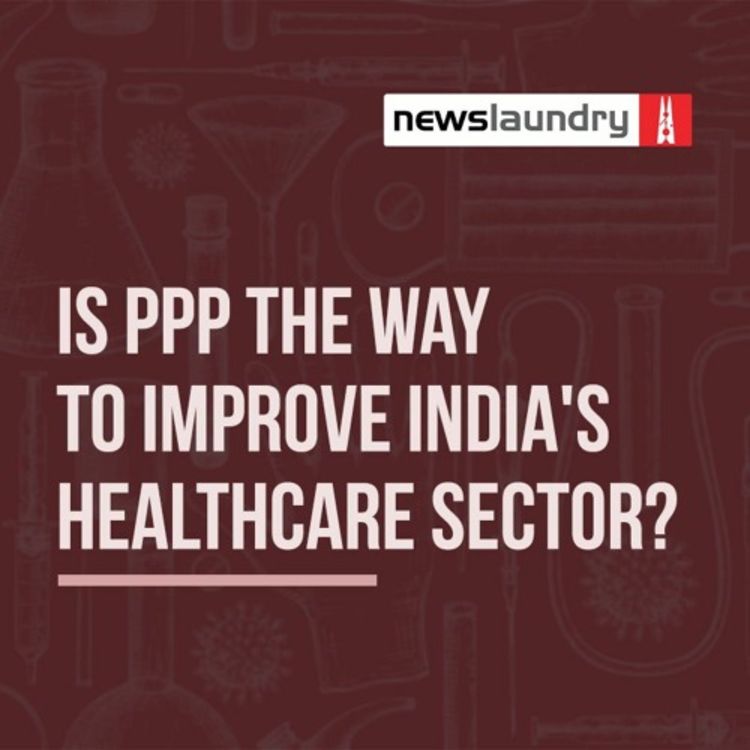Share

Newslaundry Conversations
NL Conversation: Are public-private partnerships the solution to India’s healthcare woes?
•
The coronavirus pandemic has revealed in tragic detail the inadequacies of India’s healthcare system. While public healthcare, especially outside of major cities, is at best rudimentary, the private health sector, which accounts for the bulk of the nation’s healthcare facilities, has come up short in this time of crisis.
Why is it so? What are the deficiencies in the health sector the pandemic has revealed? How have they affected the country’s handling of the coronavirus outbreak? What needs to be done now to minimise the damage from the pandemic? How can the health sector be strengthened in the long run? Do public-private partnerships offer a solution?
To discuss such questions, Newslaundry organised a webinar, hosted by Abhinandan Sekhri and featuring as panellists Dr Naresh Trehan, chairman and managing director of Medanta; K Sujata Rao, former union health secretary; Oommen C Kurian, head of health initiative at the Observer Research Foundation.
Asked whether Indian hospitals have the excess capacity to deal with the outbreak, Trehan points out how hospitals dedicated to treating coronavirus patients have been set up in every district and how private hospitals such as Medanta, Fortis and Artemis have collectively adopted a hospital in Manesar, Haryana, and turned it into a Covid treatment facility.
Citing the example of Gurugram, he says there appear to be enough hospital beds to deal with a medium-sized surge. It’ll depend a great deal on how the lockdown is lifted as well, he adds, “As important as the lockdown was, even more important is in what sequence and what manner it is lifted.” (Disclosure: Dr. Trehan is married to Madhu Trehan, the co-founder and former editor-in-chief of Newslaundry.)
Asked about the treatment costs in private hospitals, Trehan explains that those with insurance are being charged under it, and those who cannot afford treatment are being treated for free.
To understand how the public-private model works, Abhinandan asked Rao to explain its intricacies and its shortcomings. “When it comes to infectious diseases,” she explains, “it’s a public good and it is something that the government is completely responsible for.” The private sector, she adds, cannot work on “charity basis” for long.
She mentions how in some states the governments have taken over private hospitals to deal with the coronavirus outbreak, “I don’t necessarily buy that, I really feel that whatever facilities the government has, we should exploit them fully.” Moreover, the numbers right now are manageable and providing for the extreme cases is where the government is coming up short. She doesn’t think it’s a sustainable solution for the government to expect the private sector to provide free care, but “they can come up with a fair rate that will have to be worked out and negotiated”.
Kurian argues that the policy debate in India is very polarised. He agrees that there is a problem of resources in the medical sector but adds that “there are ongoing public-private partnerships which can be leveraged to fit our needs for Covid response”.
He suggests making the Pradhan Mantri Jan Arogya Yojna universal. The insurance scheme covers around 50 percent of India’s population currently, he adds, but the “problem with it’s that most private hospitals get paid pretty late”.
Watch.
This stakeholder consultation is part of a project supported by the Thakur Family Foundation. The Thakur Family Foundation has not exercised any editorial control over the project.
More episodes
View all episodes

Another Election Show: In Uttarakhand, what will decide votes? UCC, Ankita Bhandari or illegal tombs
51:42The Another Election Show caravan has reached Uttarakhand. In this episode, Atul Chaurasia sits down with the leaders of political parties’ youth wing, journalists and students of DAV College in Dehradun to understand the undercurrents in the state ahead of the Lok Sabha polls. We particularly gauge the mood in the Haridwar Lok Sabha constituency, which earlier recorded volatile political scenarios, and has mostly been held by the BJP. In the current polls, BJP’s former chief minister Trivendra Singh Rawat and Congress’s ex-CM Harish Rawat’s son Virendra Rawat are in the fray in Haridwar. Also contesting are Umesh Kumar, a journalist-turned-politician standing as an independent candidate, and BSP’s Jalil Ahmed Qasmi. Notably, the constituency has significant Muslim and Dalit voters.Atul is also joined by senior journalist Jai Singh Rawat, Baramasa editor Rahul Kotiyal, and senior journalist Pradeep Sati. From the Uniform Civil Code to unemployment, Ram Mandir, migration for jobs, and the infamous Ankita Bhandari murder case that rocked the state – what are the major issues plaguing Haridwar and Uttarakhand?
Another Election Show: In Azam Khan-bastion Rampur, what’s the poll plank? Ram mandir or jobs?
38:58Polling for the Lok Sabha elections is set to begin. So, Atul Chaurasia and Manisha Pandey have hit the ground, to bring you the most authentic voices on Another Election Show – starting from Uttar Pradesh’s Rampur.Rampur – a bastion of the now-jailed Samajwadi Party leader Azam Khan – is one of the 102 seats to go to polls in the first phase of the elections beginning on April 19. The constituency with 52 percent Muslim vote share, and 48 percent vote share of Hindus and others, has been a stronghold of the Congress, and then Azam Khan. But after Khan’s conviction in four cases in October 2022, is the constituency again charting its own course? In the 2022 by-elections, the BJP’s Ghanshyam Singh Lodhi won the seat. Is he looking at a repeat win? Meanwhile, the SP has fielded Mohibullah Nadvi, imam of a Delhi-based mosque, who has been unable to appeal to Khan’s supporters. The Bahujan Samaj Party’s candidate is Zeeshan Khan. Will it divide the Muslim votes? Newslaundry spoke to the students of Rampur’s Raza PG College and advocate Junaidur Rahman about the undercurrents ahead of the polls, the local politics, and issues that matter the most. How’s the table turning in Rampur? Tune in.
Morning Show: Who is BJP’s real star campaigner in Madhya Pradesh?
58:30In this episode, we look at the BJP’s poll campaign in Madhya Pradesh and the factors that may lead to voter fatigue. How is the Ladli Behna scheme faring? Why is the BJP fighting the polls in the name of Modi? Despite chief minister Shivraj Singh Chouhan being the tallest BJP leader in the state, has he been sidelined in the polls campaign? We also discuss issues of corruption, malnutrition and politics of ‘freebies’ in Madhya Pradesh. Meanwhile, Congress has put up an aggressive campaign under Kamal Nath. Will they finally come to power in the state?Watch.
मॉर्निंग शो: ‘मुफ्त’ की घोषणाओं और ‘कभी न पूरे होने वाले’ चुनावी वादों पर क्या सोचता है मध्य प्रदेश का युवा?
48:12न्यूज़लॉन्ड्री की टीम मध्य प्रदेश में विधानसभा चुनाव की कवरेज के लिए ग्राउंड पर है. हर बार की तरह इस बार भी टीम "मॉर्निंग शो" के जरिए विभिन्न वर्गों के बीच जाकर उनकी राय जान रही है. मॉर्निंग शो के इस एपिसोड में हमारी टीम ने राज्य के ताजा चुनावी मुद्दों को लेकर युवाओं से बातचीत की. इसके लिए हमारी टीम भोपाल में स्थित जागरण लेक सिटी यूनिवर्सिटी परिसर पहुंची. इस दौरान छात्र-छात्राओं से विभिन्ना पार्टियों द्वारा ‘मुफ्त में सुविधाएं और सेवाएं दी जाने की घोषणाओं समेत चुनावी वादों पर खुलकर चर्चा की. कभी ना पूरे हो पाने वाले पार्टियों के चुनावी वादों, लोकतंत्र में बदलाव, बढ़ती बेरोजगारी आदि मुद्दों के के अलावा पिछले पांच वर्षों में शिवराज सिंह की उपलब्धियों पर भी युवाओं की राय जानी. साथ ही आरक्षण और जाति के मुद्दे पर भी उनसे बात की. बातचीत के दौरान महिला सुरक्षा का मुद्दा भी प्रमुख रहा. हमारी टीम ने ये भी जानने की कोशिश की कि आखिर आरक्षण का आज के समय में युवाओं खासकर विद्यार्थियों के जीवन में क्या महत्व है और महिला सशक्तिकरण संबंधी सरकारी योजनाओं को छात्राएं किस नजरिए से देखती हैं. इन सब सवालों के जवाब जानने के लिए देखिए ये पूरी बातचीत.
Morning Show: What Chhattisgarh’s young voters think of education, welfare state, manifestos
51:32In this episode, we try to understand the issues that matter to young voters, and how they view the manifestos of political parties and the concept of a welfare state. We reach the Guru Ghasidas Vishwavidyalaya campus in Chhattisgarh’s Bilaspur, where questions on education, corruption, the Mahadev app scam case, as well as the track record of the Bhupesh Baghel government come up during our conversation with students. Students tell us what they think about the promises made by political parties for farmers. A section of them also raise the issue of safety of women. Watch.
Morning Show: Paddy as poll pivot, Mahadev app, Chhattisgarh pride
52:21In this episode of Morning Show from Chhattisgarh’s Raipur, we talk about the poll issues with some of the credible voices of the state, including senior journalists, social activists and a former bureaucrat. The price of paddy has reportedly emerged as the biggest poll issue in the current elections in Chhattisgarh. In its manifesto, the BJP has promised to purchase paddy at Rs 3,100 per quintal. Meanwhile, the Congress has promised to increase the rate from Rs 2,600 to Rs 3,000 per quintal. The other big poll issues are farmers’ loan waiver, Chhattisgarhi identity, and the alleged Mahadev App scam, which the Enforcement Directorate has reportedly linked to chief minister Bhupesh Baghel. Will these issues influence voters’ decisions? Listen.
मनोज झा: इंडिया एलायंस, जी-20, संसद का विशेष सत्र और मोदी के हाथ में भाजपा
54:15एनएल इंटरव्यू में इस बार राष्ट्रीय जनता दल (आरजेडी) के राज्यसभा सांसद मनोज झा से बातचीत हुई. इसमें ‘इंडिया’ और भारत के बीच उठे विवाद, जी 20 के आयोजन, एक देश, एक चुनाव, संसद का विशेष सत्र के अलावा मीडिया द्वारा विपक्ष को निशाना बनाने की प्रवृत्ति पर विस्तार से बातचीत हुई. विपक्षी गठबंधन ‘इंडिया’ के सत्ता में आने के एक सवाल पर मनोज झा कहते हैं, “यदि हमारी पार्टी की सरकार बनती है तो भाजपा को भी आज़ादी मिलेगी. मोदीजी के नेतृत्व में भाजपा की सांस भी फूल रही है. भाजपा को भी आज़ादी की ज़रूरत है.” गठबंधन के नाम को निशाना बनाए जाने और भारत बनाम इंडिया की बहस पर वे कहते हैं, “मीडिया संस्थान कितनी मेहनत करके डॉट लगाकर गठबंधन का नाम लिखते हैं लेकिन पाठक उसे इंडिया ही पढ़ते हैं. हमें ये पता था कि इंडिया नाम रखेंगे तो भाजपा भारत के नाम पर विवाद खड़ा करेगी. इसीलिए हमारी पार्टी ने पहले दिन टैगलाइन निर्धारित की थी- ‘जुड़ेगा भारत, जीतेगा इंडिया.’ भाजपा और कुछ मीडिया संस्थान जिस तरह से हताश हैं, ऐसा न हो कि वो कहने लगें कि सभी नाम खारिज करके देश का नाम जम्बूद्वीप होना चाहिए.”जी ट्वेंटी शिखर सम्मेलन को लेकर झा कहते हैं, “किसी भी देश में ऐसा नहीं हुआ है कि कर्फ्यू और सन्नाटे वाले माहौल में जश्न मनाया गया हो. इसमें लोकतंत्र की खुश्बू नहीं आती है, बल्कि राजतंत्र की बदबू आती है.”इसके अलावा मनोज ने केंद्र सरकार द्वारा 18-23 सितंबर तक बुलाए गए संसद के विशेष सत्र, एक देश, एक चुनाव, पीएम नरेंद्र मोदी के कार्यकाल के दौरान सरकारी संस्थाओं में आए बदलाव और मीडिया के सत्ताधारी पार्टी की तरफ झुकाव आदि विषयों पर बेबाकी से अपनी राय रखी.

NL Interview: BJP Kuki MLA Paolienlal Haokip on crime against women in Manipur, governments’ action
51:54The BJP MLA from Saikot in Manipur’s Churachandpur district said he believes prime minister Narendra Modi’s priorities are misplaced.